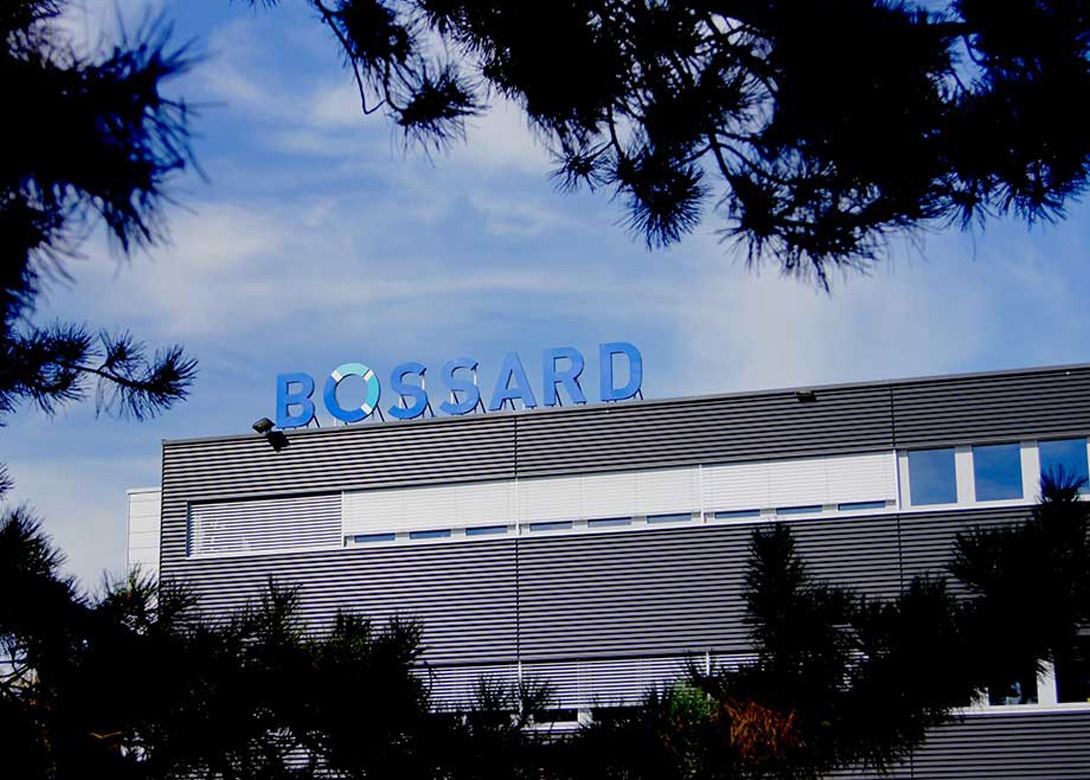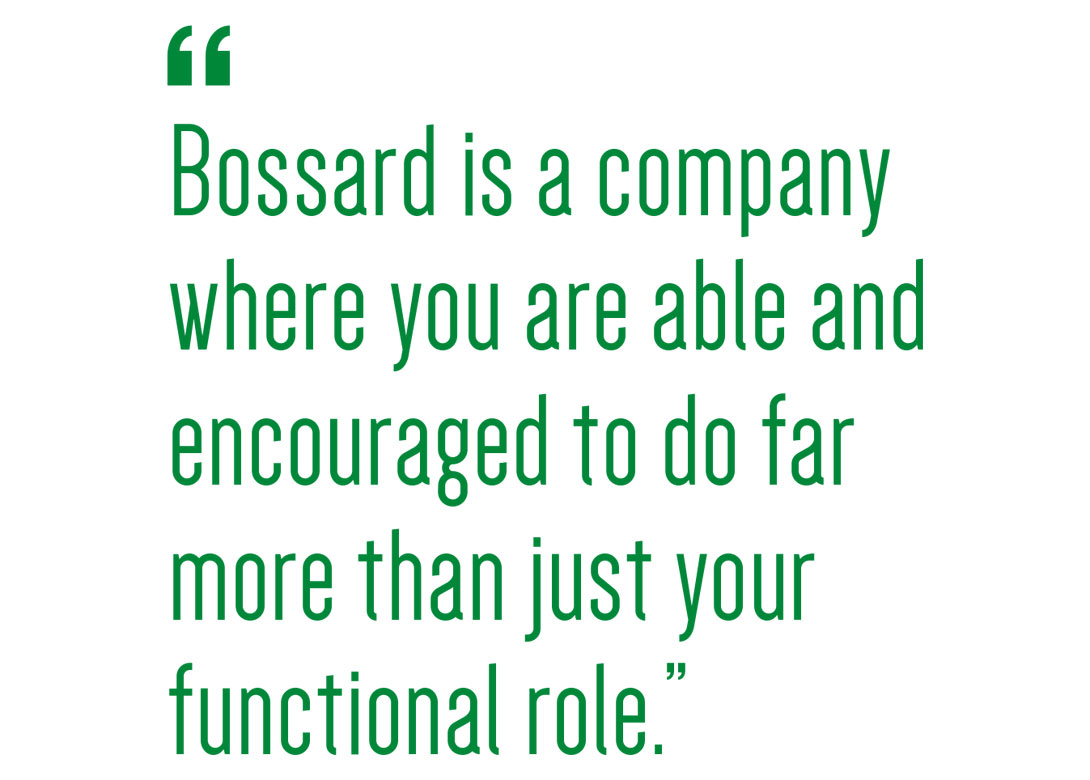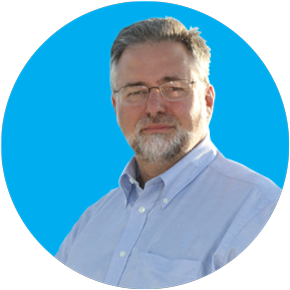As the guard changes
19 March 2019
David Dean steps down as CEO of the Bossard Group from the AGM in April this year, with the board of directors already unanimously electing Dr Daniel Bossard as his successor. Executive Editor Phil Matten met with both at the Group’s corporate headquarters in Zug, Switzerland, to reflect on fifteen years in which Bossard has developed and grown remarkably.
David Dean was appointed Group CEO in 2005, having served as Bossard’s CFO between 1994 and 2004. Previously he was corporate controller and a member of the executive committee of an international logistics group, and before had a ten year career with PricewaterhouseCoopers AG.
Daniel Bossard joined the company in 2000, having worked as a consultant for Accenture. From 2003 to 2006 he was general manager of Bossard Denmark, before spearheading the realignment of sales strategies and the development of international customer relations in the Bossard Group. In 2009 he was appointed CEO northern & eastern Europe and member of the Bossard executive committee.
“When Bossard was one of my clients,” recalls David Dean, “one of the things I always admired was that the CFO was one of the most atypical CFOs I ever encountered. Here was not the guy always looking back – he had ideas, he looked to the future”.
“One of the things that has kept me here for 27 years is that Bossard is a company where you are able and encouraged to do far more than just your functional role.”
So, in what condition was the company when he took up the responsibilities as CEO? “We had gone through a phase of acquisition in the United States, which had been a bit problematic. We were in the middle of getting Asia up and running as a greenfield project. And we were still wrestling with the effects of the 2001 crisis.”
“Bossard was not really a coherent Group – more a collection of twenty companies, with the same name but far from providing the same services to the market.” The first three years, David Dean says, were “spent putting our house in order”. One key initiative was the adoption of the same IT system worldwide. “Before, we trained people, explained how it should be done. They went back and within a couple of weeks were falling back into their previous ways. Only with a common system could we make sure change was sustainable – that the system led people to do things the right way.”
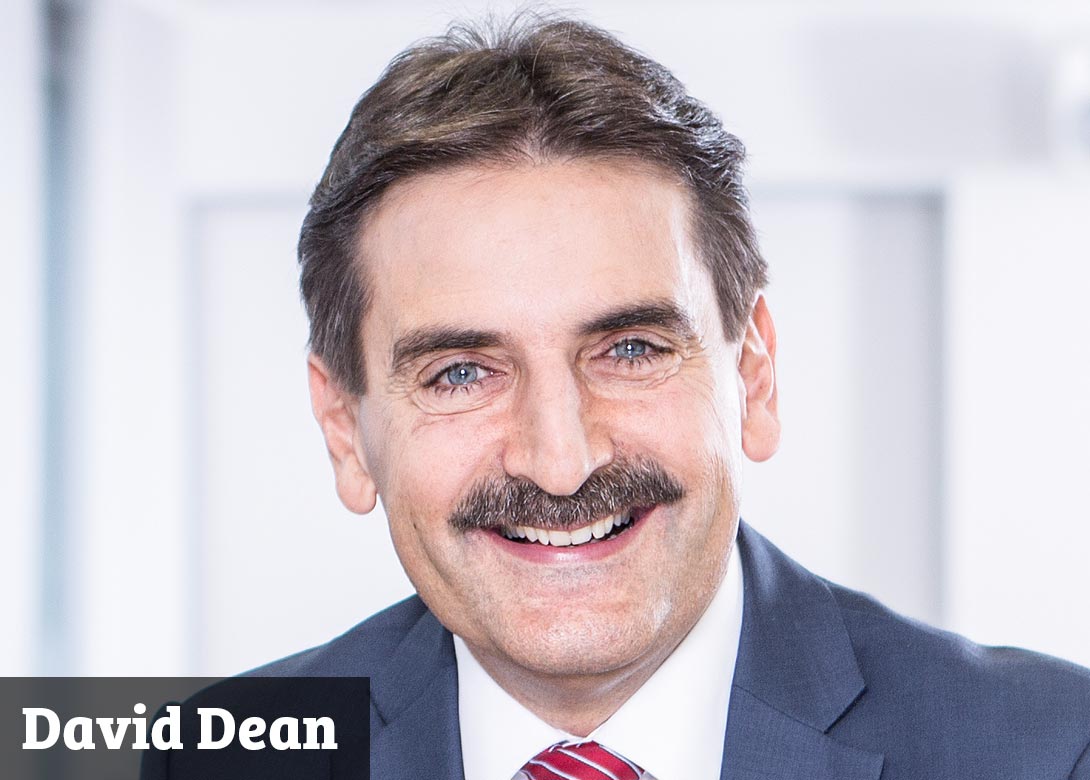
Within three years the world economy had descended into the maelstrom of the 2008/2009 financial crisis. “Not that I would want to see it repeated,” asserts Dean, “but in a way it was a good thing. It was an acid test of whether what we had built would hold up. Actually, it proved to be the worst recession, with a 30% fall in revenue. Yet, we still found it possible to achieve a profit, in which we were almost proud in the context of the years before”.
Fortunately, market conditions rebounded fairly quickly and Bossard was able to harvest some of the fruits of what it had done internally. “That’s when we said: ‘OK, we’ve built the foundation, so now let’s refocus on the market, and grow’.” Not growth for the sake of growing, David Dean emphasises, but to earn some money. “It was time to focus on the right customers, do the right things effectively and efficiently.”
Bossard also started on the acquisition trail again. “We had learnt a lot the hard way. There are a lot of companies that are in lower profitability, that play a traditional role as a distributor – they buy it, they sell it. We thought, ‘we know that part, we just add the Bossard services we want and things improve’. However, we underestimated the efforts to make the cultural shift. Customers are customers of a company for a reason, and not necessarily enthusiastic about what an acquirer adds, so you can lose quite a few that way. Then the people within the business are used to do things a certain way. Not everybody was fit to make the transition. There was a lot of effort expended into making it Bossard – that actually we could use in a better way.”
From then on, the focus was to find acquisitions that could complement what Bossard did – whether in product or service solutions. That included identifying specialist niche businesses that might be acquired and their competence multiplied globally. “Bringing more knowhow into the Group, rather than to find someone that is doing the same thing as we do, which is not, in practice, really out there. In this way, we started to combine organic growth with carefully targeted acquisitions to broaden our solutions base.”
Through the last fifteen years Bossard has established a genuine and consistent global footprint. “There was a time when a lot of the output was coming from Switzerland, but meantime we were getting stronger and stronger input from everywhere else,” explains David Dean. “So, Zug is no longer the epicentre, with things being invented here that others follow. There were great ideas from other places, increasingly ahead of what we could develop here.”
Today the operation in Zug is primarily for the Swiss market. The IT for the whole group is controlled centrally, and there are some functional roles that emanate from the corporate headquarters. The Swiss distribution centre, however, is primarily for the domestic market and to support smaller European markets. “We have the widest assortment here, so if we build up a market it is logical to support it from here – a logical function of scale efficiencies in logistics operations and inventory holding. In the bigger country markets we have dedicated distribution centres – our big distribution centre in Germany is ultimately going to service most of the EU. Currently there are no big issues with supplying from Switzerland – the border crossings are electronic and efficient – but we have to be conscious these things can change.”
In fact, David Dean has more concerns about whether Swiss industrial customers could ultimately have greater difficulties exporting to the EU, their biggest market. Overall, however, the challenge of greater global protectionism and trade barriers are less of an issue today because of Bossard’s global footprint. “If a Swiss customer moves out of Europe, we can follow – in most cases already be where they go. We are seeing the impact of US‑China trade tensions with things moving out of China, to other parts of south-east Asia, to eastern Europe, to Mexico. Bossard is already there, so while there may be short term pressures on the supply chain, we provide our customers with the security we can support them, wherever they are in the world.”
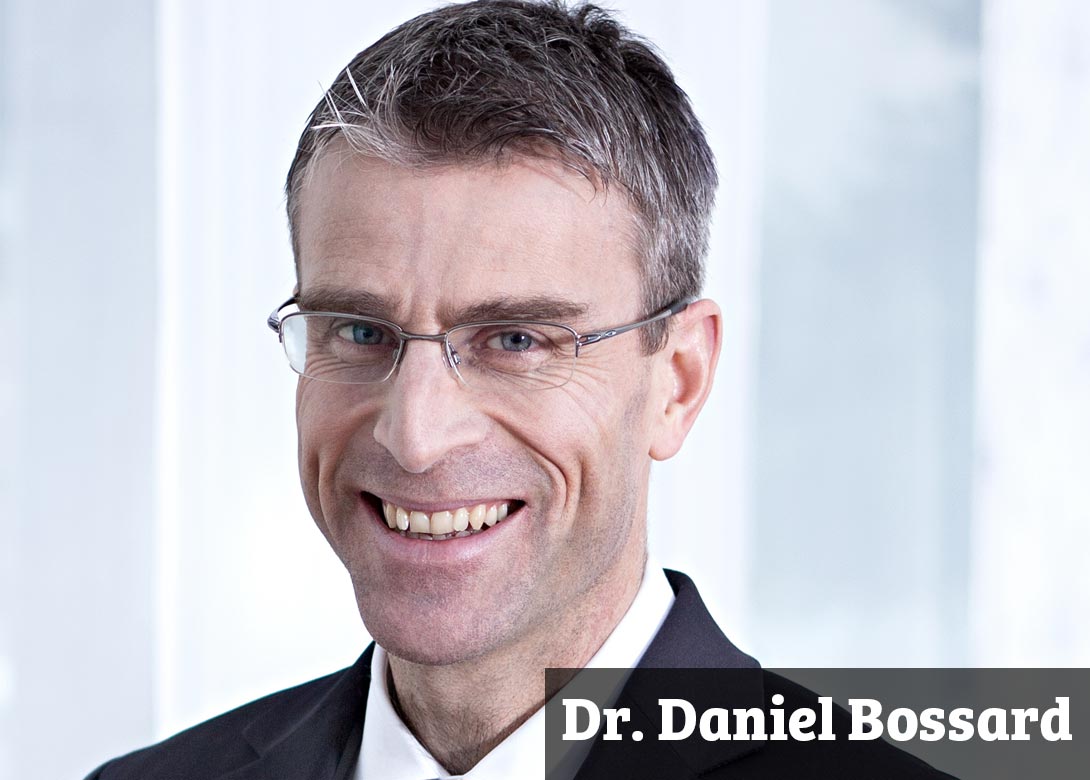
“I don’t like protectionism, but it will probably never go away. Politicians are elected to achieve what people in their own country want, and they won’t get re-elected if they don’t. There is an inherent self-interest in what, say, Donald Trump does. However, it’s not fun – it slows the world economy for no good reason.”
“We have also to put it all in context,” interjects Daniel Bossard. “Our global market share is 1%. Populations are growing globally, we are widespread across many industries, across many countries, so the opportunities are by far greater than the any problems we face. The challenges will always be there in some form and we are simply getting stronger and better at dealing with them for our customers.”
One sector in which Bossard historically played a minor role is automotive. As powertrains rapidly evolve that has clearly changed. “Automotive developed its own supply chain,” explains David Dean. “High volumes, relatively defined assortments – mainly manufacturer to manufacturer business. The value add for us was limited – which is why we consciously stayed out.”
“Through the EV route, somewhat by chance, we got into it. Before Tesla was really known, Bossard was involved in their design process. This was not a car company, it was a disruptor with a vision focused on very specific technologies, looking for solutions. Although it has changed somewhat now, as conventional automotive expertise has been drawn into the business, the original concept was to use standard components, to avoid reinventing something that was already out there. Bossard specialised in providing solutions – and that’s how we got in.”
“It has become a super reference for Bossard to all kinds of start-ups,” says David Dean. “These guys need partners to help industrialise what they want to do. They are far more open to support in engineering, to using outside people to help them so they can focus on their core thing, their special knowledge. That’s the mentality of this new breed of entrepreneur – something for which Bossard is well positioned to be extremely relevant. We don’t have to convince them with nice PowerPoints – we have a solid track record of success in their world.”
“The other development that has changed our relationship to the sector,” explains Daniel Bossard, “is that we now have relevant single solutions, related to lightweighting, advanced materials. We are able to interface with design engineers to introduce specific solutions. We can solve problems that automotive encounters through accelerated change, and then with those solutions tested and qualified, we can multiply them into our general industry customer base”.
Aerospace, David Dean acknowledges, is more challenging to penetrate. “We are looking for acquisition opportunities but face a very consolidated market. However, the aircraft makers want to double the number of planes they build today and there are clear dissatisfactions with a supply chain that has become a closed club, protecting nice margins, but not really challenging each other. It’s significant that Boeing has taken the extraordinary step of acquiring an aerospace fastener distributor. They and Airbus are intent on engendering change.”
While Bossard looks for the right acquisition, it is doing solid groundwork, most recently adding AS 9120 accreditation at its Italian operation to that it already holds in France, the USA and Switzerland.
Perhaps one of the more surprising acquisition paths for Bossard has been into Additive Manufacturing. “The original speculation was whether 3D printing might even replace the fastener industry,” explains David Dean. “There were so many different perceptions amongst the board about what it was and what it was not, whether it was a realistic threat or an opportunity, we decided we needed to go and understand the reality. We looked into one of the biggest printing companies in Europe, we looked at printer manufacturers, we looked at the materials.”
“What we learnt was there is lot of demands of the engineering but there is no sense in bringing an existing product to 3D printing, the cost factor is just too high. So, you need a design engineer who thinks about what this technology could bring that conventional manufacturing technology cannot. That’s where we have a real interest – helping the customer find solutions. In order to understand what the technology can do we need to get our feet wet – so we decided to get involved in selling the printers, selling the material, so that we can see what is happening, and understand the capabilities.”
“There is a close relationship between the design and printing knowledge, a lot of trial and error. This is why we now engage with some start-ups also to learn more. That is understanding we can bring into the design office of our customers. For us it is a learning process, a piloting, to get some real-life experience. Then we can decide whether to invest more and expand.”
“That’s about Bossard thinking in the longer term – it’s not going to bring a lot of revenue short term, but it will develop a perspective, either as an early warning of a threat to our current business, or as we now increasingly believe, it will present an opportunity to provide more solutions.”
“It is also connected to the fact we go more and more into engineering consulting,” says Daniel Bossard. “So, it’s about us really understanding the possibilities of additive manufacturing. Without that it is difficult to provide comprehensive consulting.”
Ask David Dean about the greatest challenges in his term of office and he demurs: “There are always challenges”. Ask him about the differences he has made and he remains modest but voices what he hopes they will prove to be. “We have built up a good team of people who are not waiting for me to tell them what to do. We have a team with self-drive and motivation, pursuing something that they believe in.”
“There was a time when we had geographic kingdoms operating by themselves. Now we have group management that sees the whole thing, knows how to learn and adopt from each other, and goes with the same strategy.”
“That all sounds simple, but it is where many companies fail. Officially they have the strategy, politically they cannot talk to each other.”
“If you look at Bossard’s top and middle management, we have really good stability. People like the way they can work, they have some scope for personal entrepreneurship. We have a strategy, everybody understands it, but the individual manager has a certain room to manoeuvre. We are using the brains of our people.”
“I have always said, if I stepped out and everything falls apart, then I would have failed. I know that will not be the case in Bossard.”
